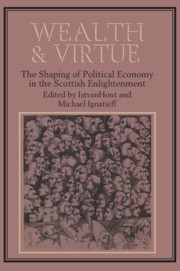Book contents
- Frontmatter
- Contents
- Preface
- List of abbreviations
- 1 Needs and justice in the Wealth of Nations: an introductory essay
- 2 Where had the Scottish economy got to by the third quarter of the eighteenth century?
- 3 Gershom Carmichael and the natural jurisprudence tradition in eighteenth-century Scotland
- 4 The Scottish professoriate and the polite academy, 1720–46
- 5 From applied theology to social analysis: the break between John Locke and the Scottish Enlightenment
- 6 The Scottish Enlightenment at the limits of the civic tradition
- 7 Adam Smith as civic moralist
- 8 The legal needs of a commercial society: the jurisprudence of Lord Kames
- 9 Cambridge paradigms and Scotch philosophers: a study of the relations between the civic humanist and the civil jurisprudential interpretation of eighteenth-century social thought
- 10 Adam Smith's ‘enduring particular result’: a political and cosmopolitan perspective
- 11 The ‘rich country–poor country’ debate in Scottish classical political economy
- 12 John Millar and individualism
- 13 Scottish echoes in eighteenth-century Italy
- Index
7 - Adam Smith as civic moralist
Published online by Cambridge University Press: 05 June 2012
- Frontmatter
- Contents
- Preface
- List of abbreviations
- 1 Needs and justice in the Wealth of Nations: an introductory essay
- 2 Where had the Scottish economy got to by the third quarter of the eighteenth century?
- 3 Gershom Carmichael and the natural jurisprudence tradition in eighteenth-century Scotland
- 4 The Scottish professoriate and the polite academy, 1720–46
- 5 From applied theology to social analysis: the break between John Locke and the Scottish Enlightenment
- 6 The Scottish Enlightenment at the limits of the civic tradition
- 7 Adam Smith as civic moralist
- 8 The legal needs of a commercial society: the jurisprudence of Lord Kames
- 9 Cambridge paradigms and Scotch philosophers: a study of the relations between the civic humanist and the civil jurisprudential interpretation of eighteenth-century social thought
- 10 Adam Smith's ‘enduring particular result’: a political and cosmopolitan perspective
- 11 The ‘rich country–poor country’ debate in Scottish classical political economy
- 12 John Millar and individualism
- 13 Scottish echoes in eighteenth-century Italy
- Index
Summary
In this paper I present Adam Smith as a practical moralist who thought that his account of the principles of morals and social organization would be of use to responsibly-minded men of middling rank, living in a modern, commercial society. In this account Smith will appear as a philosopher who was concerned with the principles of propriety as well as with those of virtue and valued the spirit of independence and sense of ego of commercial man rather than the libertarian civic virtues of the classical republican. He will, above all, appear as the philosopher who saw the province as the true source of the opulence, freedom and political wisdom that was needed to maintain the fabric of a commercial polity in a modern age.
It is now customary to think of the Scottish social philosophers as moral philosophers who were anxious to introduce the methods of the natural into the moral sciences. As an intellectual historian, I prefer to think of them as practical moralists who had developed a formidable and complex casuistical armoury to instruct young men of middling rank in their duties as men and as citizens of a modern commercial polity. Hutcheson, Smith, Ferguson, Reid and Stewart were professors of moral philosophy who saw their curricula as devices to teach their pupils to ‘adorn your souls with every virtue, prepare yourselves for every honourable office in life and quench that manly and laudable thirst you should have after knowledge.’
- Type
- Chapter
- Information
- Wealth and VirtueThe Shaping of Political Economy in the Scottish Enlightenment, pp. 179 - 202Publisher: Cambridge University PressPrint publication year: 1983
- 48
- Cited by

